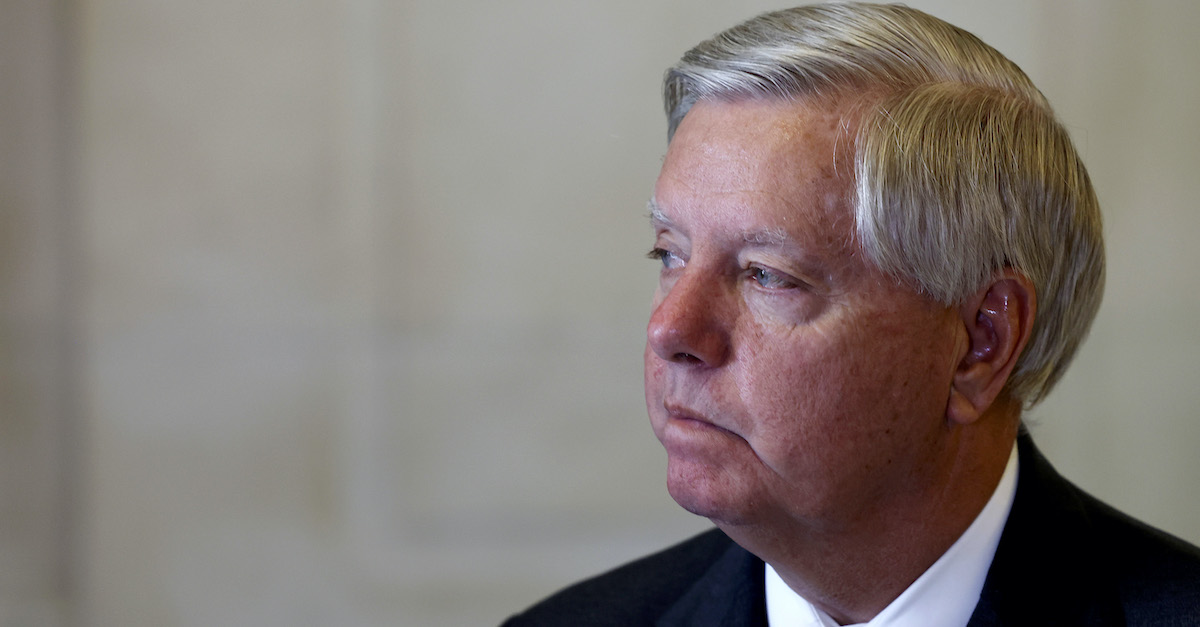
Sen. Lindsey Graham (R-S.C.) listens as Sen. Ted Cruz (R-Texas) speaks at a press conference at the U.S. Capitol on June 22, 2022 in Washington, D.C.
A Georgia judge ordered Sen. Lindsey Graham to testify in a special grand jury probe about former President Donald Trump’s efforts to overturn the election there, finding the South Carolina Republican a “necessary and material witness in this investigation.”
When Fulton County District Attorney Fani Willis’s (D) subpoena first became public this month, Graham vowed to fight it and released a statement through his attorneys characterizing it as “politics.” His attorneys claimed that Willis planned to share his testimony with the Jan. 6th Committee.
On Monday evening, Fulton Superior Court Judge Robert McBurney found that the district attorney is entitled to learn more about Graham’s two reported calls with Georgia Secretary of State Brad Raffensperger (R).
“During the telephone calls, the Witness questioned Secretary Raffensperger and his staff about reexamining certain absentee ballots cast in Georgia in order to explore the possibility of a more favorable outcome for former President Donald Trump,” the ruling states. “The Witness also made reference to allegations of widespread voter fraud in the November 2020 election in Georgia, consistent with public statements made by known affiliates of the Trump Campaign.”
Graham’s attorneys Bart Daniel and Matt Austin previously released a statement that Fulton County investigators told them the senator “is neither a subject nor target of the investigation, simply a witness.”
The senator’s representatives indicated in an email to Law&Crime that they intend to respond with a filing in the upcoming days.
Attorney Mitchell Epner, a former federal prosecutor, told Law&Crime that he saw little basis for Graham to challenge the subpoena further.
“I do not see any plausible basis to appeal this material witness order,” said Epner, who is a partner at Rottenberg Lipman Rich, PC.
McBurney emphasized that he believed Graham to be an “essential” witness.
“The witness possesses unique knowledge concerning the substance of the telephone calls, the circumstances surrounding his decision to make the telephone calls, the logistics of setting up the telephone calls, and any communications between himself, others involved in the planning and execution of the telephone calls, the Trump Campaign, and other known and unknown individuals involved in the multi-state, coordinated efforts to influence the results of the November 2020 election in Georgia and elsewhere,” the ruling states. “Finally, the witness’s anticipated testimony is essential in that it is likely to reveal additional sources of information regarding the subject of this investigation.”
The judge said that Graham must appear before the special grand jury in Atlanta between Aug. 2 and Aug. 30.
“The witness shall be given protection from arrest and from service of civil or criminal process, both within this State and in any other state through which the witness may be required to pass in the ordinary course of travel, for any matters which arose before the witness’s entrance into this State and other states, while traveling to and from this Court for the purpose of testifying for this case,” the judge’s certificate states.
Willis opened her special grand jury probe in January, empowered to investigate Trump’s efforts to overturn his electoral defeat in the Peach State. In a now-infamous phone call, Trump urged Raffensperger to “find 11,780 votes,” the precise number needed to surpass President Joe Biden. Raffensperger refused, rejecting Trump’s false claims of widespread election fraud. The special grand jury will not be empowered to return an indictment, but its findings could be used to support eventual criminal charges.
Read the ruling below:
(Photo by Anna Moneymaker/Getty Images)